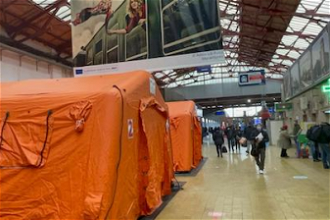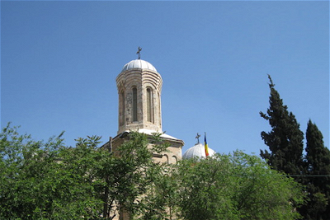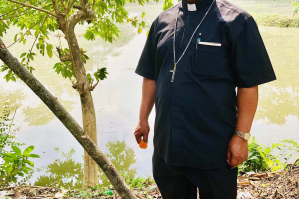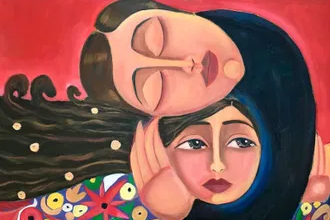Pope in Romania: Mass in Blaj, seven beatifications
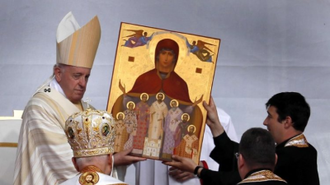
Pope with icon of Our Lady and the seven martyrs
Source: Vatican Media
Pope Francis arrived in the city of Blaj in Transylvania - the principal religious and cultural centre of the Romanian Greek-Catholic Church this morning. More than 100,000 people gathered with him for the celebration of the Divine Liturgy.
The Pope took his inspiration from the Gospel of the day (John 9:2), in which we hear how Jesus restores the sight of the man born blind. Instead of acknowledging the miracle, the Pharisees question everything about it, including the authenticity of the man's blindness, and Jesus' right to heal on the Sabbath.
"The whole scene and the arguments that follow show how hard it is to understand the actions and priorities of Jesus, who brings someone from the periphery into the centre," said Pope Francis.
"The blind man had to live not only with his own blindness, but also with the blindness of those around him," continued the Pope. He pointed to "the resistance and hostility that can arise in the human heart when, instead of putting people at the centre, we put special interests, labels, theories, abstractions and ideologies, which manage only to blind everything around them". Pope Francis contrasted this with the Lord's approach: "Far from hiding himself behind inaction or ideological abstractions, He looks people in the eye", said the Pope. "He sees their hurts and their history. He goes out to meet them and He does not let Himself be sidetracked by discussions that fail to prioritize and put at the centre what is really important."
Pope Francis then referred to the experience of Romania under communism: "You were forced to endure a way of thinking and acting that showed contempt for others and led to the expulsion and killing of the defenseless and the silencing of dissenting voices," he said. The Pope spoke about the seven Greek-Catholic Bishops he had come to beatify. "With great courage and interior fortitude, they accepted harsh imprisonment and every kind of mistreatment, in order not to deny their fidelity to their beloved Church", he said. "They handed down to the Romanian people a precious legacy that we can sum up in two words: freedom and mercy": the freedom to live a "diversity of religious expressions", and the mercy that "conquers anger and resentment by love and forgiveness."
Pope Francis concluded his homily by warning against new forms of "ideological colonization" that "quietly attempt to assert themselves and to uproot our peoples from their richest cultural and religious traditions". "May you be witnesses of freedom and mercy", said the Pope, "allowing fraternity and dialogue to prevail over divisions, and fostering the fraternity of blood that arose in the period of suffering, when Christians, historically divided, drew closer and more united to one another."
All seven of the Greek-Catholic bishops were arrested in 1948. All of them were imprisoned and left to die of hunger, exposure, disease, or the effects of hard labour, and then buried in unmarked graves. The liturgical chair used during the Divine Liturgy in Blaj on Sunday, was made from the wooden planks of the prison beds, and from the iron bars of the prison windows where some of the martyrs died.
Iuliu Hossu
Romania was under Soviet occupation and ruled by Nicolae Ceausescu, when Iuliu Hossu returned there after completing his theology studies in Rome. He spent 22 years in prison. His last words were: "My battle is over, yours continues". He never knew that Pope Paul VI had created him a Cardinal "in pectore" in 1969.
Vasile Aftenie
Vasile Aftenie also studied in Rome. A year after his arrest he was transferred to the infamous Ministry of the Interior where he suffered terrible tortures and eventually died of his wounds in 1950.
Ioan Balan
In 1929 Ioan Balan was appointed to the Vatican Commission to draw up the new Code of Canon Law of the Eastern Churches. After his arrest in 1948, he was placed in solitary confinement and died in 1959 without ever being tried or sentenced.
Valeriu Traian Frentiu
Valeriu Traian Frentiu was ordained a bishop when he was only 37 years of age. Also arrested in 1948, he spent the rest of his life in a concentration camp. When he died in 1952, his body was thrown into an unmarked grave.
Ioan Suciu
Ioan Suciu was ordained a priest in 1931. He too died of hunger and disease while in prison. In his last letter to the faithful before his arrest, he wrote: "Do not be deceived by vain words, promises, lies... We cannot sell Christ or the Church".
Tito Liviu Chinezu
Tito Liviu Chinezu was born in 1904. He was ordained a bishop in prison by those bishops who were themselves prisoners. When the secret of his ordination leaked out, he was transferred to a prison where he died of cold and hunger.
Alexandru Rusu
Alexandru Rusu was consecrated bishop in 1931. Arrested in 1948, he was sentenced to 25 years in prison for instigation and high treason. He died in 1963 and was buried in the prison cemetery without any religious rite.
From the night of the 28 November 1948, when all the Greek-Catholic bishops were arrested, until the 25 December 1989, which marked the end of the Communist regime, the only Divine Liturgy in the Romanian language available to the faithful in that country, was that broadcast by Vatican Radio.
Read the full text of Pope Francis' homily here: www.vaticannews.va/en/pope/news/2019-06/pope-francis-divine-liturgy-beatification-martyrs-blaj.html



